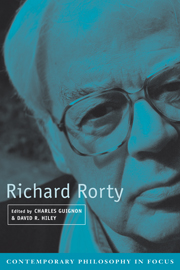Book contents
- Frontmatter
- Contents
- Contributors
- Acknowledgments
- Abbreviations
- Richard Rorty
- 1 Introduction: Richard Rorty and Contemporary Philosophy
- 2 Rorty's Critique of Epistemology
- 3 Rorty on Knowledge and Truth
- 4 From Realism or Antirealism to Science as Solidarity
- 5 Rorty's Democratic Hermeneutics
- 6 Rorty's Inspirational Liberalism
- 7 Don't Be Cruel: Reflections on Rortyan Liberalism
- 8 Rorty and Philosophy
- Bibliography
- Index
7 - Don't Be Cruel: Reflections on Rortyan Liberalism
Published online by Cambridge University Press: 18 December 2009
- Frontmatter
- Contents
- Contributors
- Acknowledgments
- Abbreviations
- Richard Rorty
- 1 Introduction: Richard Rorty and Contemporary Philosophy
- 2 Rorty's Critique of Epistemology
- 3 Rorty on Knowledge and Truth
- 4 From Realism or Antirealism to Science as Solidarity
- 5 Rorty's Democratic Hermeneutics
- 6 Rorty's Inspirational Liberalism
- 7 Don't Be Cruel: Reflections on Rortyan Liberalism
- 8 Rorty and Philosophy
- Bibliography
- Index
Summary
Richard Rorty is not only a leading light of the revival of pragmatism but one of its chief beneficiaries. His work has penetrated far and wide. He has become a kind of antiphilosopher philosopher. Rorty is an intelligent and canny thinker. He can be a powerful writer. But he tends invariably to undercut whatever gravitas might inhere in his own position with moves toward what is best called the “unbearable lightness of liberalism,” or at least one dominant contemporary version of it. There are many entry points into Rortyan discourse, although Rorty doesn't make the task of expositor and critic all that easy. How so? Because his arguments are often slippery and difficult to engage. Just when you think you've come up against something solid, it turns squishy. My hunch is that this is because Rorty wants to embrace, not to debate, to draw us all under the big tent of “we liberal ironists,” “we pragmatists,” “we antiessentialists,” we who “don't do things this way,” we … we … we. In Contingency, Irony, and Solidarity, Rorty uses the “we” word nine times in one short paragraph (CIS 79–80). Those of us who resist such “we-ness” are left to sort out just how, why, and where we disagree. I will begin with a few assorted discontents that evolve into deeper engagements, including a fleshed-out counterpoint to Rorty's positions on Freud, cruelty and self-creation, and redescription.
- Type
- Chapter
- Information
- Richard Rorty , pp. 139 - 157Publisher: Cambridge University PressPrint publication year: 2003
- 10
- Cited by



